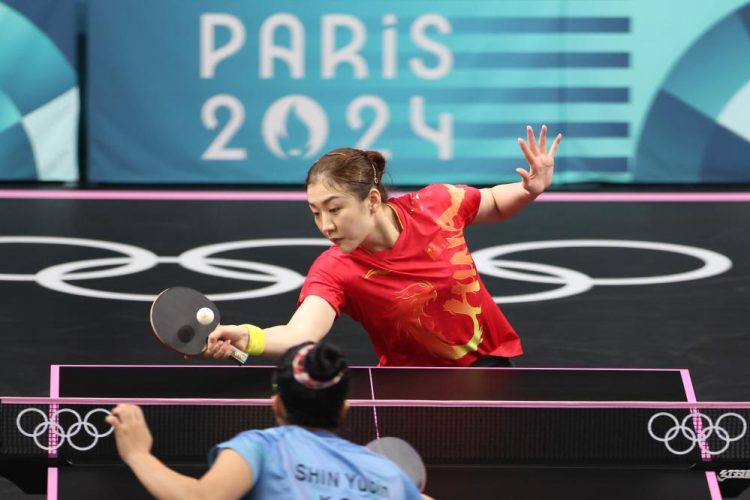China has long been the undisputed king of table tennis, with its athletes consistently claiming top honors in international competitions for decades. As the Paris 2024 Olympic Games draw near, the big question on everyone’s mind is whether Chinese table tennis players can maintain their stranglehold on the sport, or if rising competitors from other nations will break through and challenge their dominance. With China’s history of excellence, they remain the team to beat, but there are emerging challengers who may provide significant resistance in the coming months.
This article will dive into China’s prospects for continuing their supremacy in table tennis at the Paris 2024 Olympics, exploring the strengths, challenges, and the fierce global competition that will shape the upcoming games.
1. The Legacy of Chinese Table Tennis: A Tradition of Excellence
Table tennis has been China’s crown jewel in the world of sports for decades. Since the sport was introduced to the Olympic Games in 1988, China has dominated, consistently taking home gold medals across both men’s and women’s events. The national team has produced an array of legendary players—names like Zhang Jike, Ma Long, Ding Ning, and Liu Shiwen have become synonymous with excellence in the sport.
China’s success has been underpinned by a robust system of talent identification, world-class coaching, and a deeply ingrained table tennis culture. Training begins at a young age, with many of China’s top players discovering their potential before they even reach their teens. The competition within the national team is fierce, ensuring that only the best of the best make it to the international stage.
The Paris 2024 Olympics will mark another chapter in this ongoing legacy. However, the landscape of table tennis is evolving, with other countries closing the gap. The question is: Can China continue to produce champions and hold onto its throne?
2. The Strength of China’s Current Table Tennis Team
Ma Long – The “Dragon” of Table Tennis, Ma Long, is widely considered one of the greatest players in the sport’s history. Having won numerous World Championships and Olympic gold medals, Ma Long is the cornerstone of China’s table tennis dynasty. Despite being in his 30s, Ma Long’s consistency, tactical intelligence, and mental toughness make him a strong contender for gold in Paris. His ability to dominate in both singles and doubles is unparalleled, and his experience in high-pressure matches gives him a significant edge over younger competitors.
Fan Zhendong – The current World No. 1 in men’s table tennis, Fan Zhendong, is another key figure in China’s Olympic hopes. Known for his aggressive playing style and relentless focus, Fan has been a top performer at the World Championships and the ITTF World Tour. At just 26 years old, he has the potential to become a dominant force at the Paris Olympics, provided he remains consistent and handles the mental challenges that come with the pressure of Olympic competition.
Chen Meng – In the women’s division, Chen Meng is the current World No. 1 and has been a dominant figure in recent years. Her versatility, technical skill, and ability to adjust her game according to her opponent make her one of the most formidable female players in the world. Chen has shown an impressive record in major tournaments, including winning the 2020 Tokyo Olympics women’s singles gold. She will certainly be one of the favorites for the Paris 2024 Olympics.
Sun Yingsha – Another player to watch in the women’s competition is Sun Yingsha, a rising star who has already made her mark on the international stage. With her quick reflexes and aggressive style of play, Sun is one of the most exciting talents in the sport today. She won the 2021 World Table Tennis Championships and has consistently outperformed top players across multiple international tournaments. Sun’s combination of youth and experience could make her a strong contender for gold in Paris.
3. The Challenges: Rising Competition and Changing Dynamics
While China continues to be the dominant force in table tennis, the rest of the world has caught up in recent years. Players from countries like Japan, Germany, South Korea, and Sweden have been closing the gap and challenging China’s supremacy.
Japan in particular has been making great strides in recent years. Tomokazu Harimoto, at just 20 years old, is a rising star in men’s table tennis. Known for his speed, resilience, and aggressive play, Harimoto has already claimed several major titles and is considered one of the top threats to Chinese dominance. His performances at the 2020 Tokyo Olympics and World Championships prove that he has the potential to upend the established order. His rivalry with Fan Zhendong, which has already produced some thrilling encounters, is one to watch closely in Paris.
Germany’s Timo Boll, although in the latter stages of his career, remains a formidable force in the sport. His experience and tactical mastery of the game make him a difficult opponent, especially in high-pressure situations. While Boll is not the dominant force he once was, his ability to rise to the occasion on the biggest stages could allow him to disrupt China’s plans for gold.
South Korea’s Jang Woojin and Lee Sangsu have also been consistently strong contenders on the international circuit, proving that the competition is coming from all corners of the globe. South Korea’s table tennis program has been growing, and their players are showing more resilience and skill with each passing year.
4. The Mental and Physical Challenges for China’s Players
Even though China has an excellent track record, the pressure to maintain dominance can be mentally and physically taxing. For players like Ma Long and Fan Zhendong, who have been on the international circuit for years, maintaining peak performance over a prolonged period is a monumental challenge.
Injuries and Burnout are always a concern for elite athletes, and as players get older, their bodies naturally begin to wear down. Ma Long’s injury struggles in recent years have demonstrated the delicate balance between maintaining top-level performance and managing physical wear and tear. Though he remains a world-class player, the longevity of his career, especially as he approaches his mid-30s, could influence China’s overall medal hopes.
Similarly, for younger players like Fan Zhendong and Sun Yingsha, the pressure of being expected to win at every major event can be overwhelming. The weight of expectation from a nation that has dominated table tennis for so long can be a mental burden, especially in a high-stakes environment like the Olympics.

5. The Rise of Technology and New Training Methods
One factor that could give China an edge in Paris is its investment in technology and innovative training methods. Over the years, China has been at the forefront of using advanced techniques in biomechanics, data analytics, and mental conditioning to give their players the best possible advantage. With the help of sophisticated technology, Chinese athletes can track every movement and fine-tune their techniques, ensuring that they remain at the peak of their game.
Additionally, China’s meticulous approach to scouting and identifying young talent means they are constantly cultivating new players who could make an impact in the international arena. If rising players like Lin Gaoyuan and Wang Chuqin continue to improve, China could have a new generation of stars ready to keep the country at the forefront of world table tennis.
6. Conclusion: Will China’s Table Tennis Dynasty Continue in Paris?
The Paris 2024 Olympics will be a crucial test for China’s table tennis players. While the nation’s dominance over the sport is unparalleled, the competition is fiercer than ever, and several countries are closing the gap. The likes of Japan, Germany, and South Korea are fielding incredibly talented athletes who are ready to challenge the status quo.
However, China’s tradition of excellence, its world-class players, and its advanced training systems will undoubtedly make them the favorites. Ma Long, Fan Zhendong, Chen Meng, and Sun Yingsha will all be strong contenders for gold, and if the team can continue to rise to the occasion in high-pressure moments, they’ll be tough to beat.
Ultimately, the road to gold in Paris will be paved with fierce competition, and the outcome is uncertain. But one thing is clear: as long as China continues to invest in its table tennis program and produce top-tier athletes, it will remain a dominant force on the world stage.
Will Chinese table tennis players continue to reign supreme at the Paris Olympics? The answer lies in the players themselves—and their ability to meet the challenges posed by their rising rivals. The world will be watching, and the 2024 Olympics could well be another chapter in China’s ongoing legacy in table tennis.






























Discussion about this post